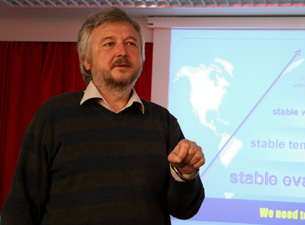
On 8 May 2008, the fourth in the lecture series of the ECLA Annual Conference on Water, Ing. Michal Kravcík expounded a new paradigm of thinking about water. In the old water paradigm, we believed that humanity has little impact on the natural water cycle and that this cycle has a negligible effect on global warming. In contrast, the ‘new water paradigm’ includes the realization of humanity’s effect on the water cycle and the major role this water cycle plays in climate change.
The lecture started with a short documentary by Katerina Zackova, ‘Air Conditioner Breakdown’, which draws a disturbing connection between our approach to water and the current increase in floods, droughts and other greenhouse effects. The documentary was an effective springboard for Kravcík’s advocation of a shift in water paradigm. Water particles in the air not only function as filters that bind greenhouse gases, they are of prime importance in heat regulation: plants evaporate water cool to down the atmosphere and stabilize heat fluctuations. As Kravcík later explained, while a surface of asphalt heats up and dries the atmosphere, a surface of vegetation cools the atmosphere and retains water in the surface layers of the soil. Unfortunately, our attitude has always been to remove water from the land in as fast and controlled a way as possible, for example, through canal systems. Additionally, since most of our crops require dry, steppe-like conditions to grow, we have been drying out the soil for centuries, such that now, large pieces of land start to resemble desserts, with high fluctuations in temperature and with only concentrated periods of heavy rainfall.
From the perspective of the new ‘water paradigm’, Kravcík proposed several realizable and cheap solutions to the problems stated above. First, we should stop draining water from the soil. Land is normally urbanized in such a way that water cannot enter the soil because it is covered with asphalt and drainage systems. Instead, we should reserve a greater area for vegetation, for example, by planting more greenery in the cities and on the roofs of our buildings. Similarly, the use of more vegetation on agricultural land would be beneficial. It would counter the greenhouse effect by the cooling effects of water evaporation. The soil would become capable of absorbing more water, reducing the chance of water streaming on top of the soil and turning into a flood in the event of heavy rainfall. The message was clear and persuasive: we should stop drying out the land and start thinking of water as something that can be used to protect ourselves from environmental calamities.
Ing. Michal Kravcík, CSc., (1956) is the founder of the People and Water NGO, a winner of the Goldman Environmental Prize and a member of ASHOKA: Innovators for the Public, an international network of innovators who work for public welfare. The People and Water NGO has been awarded the EU-USA Prize for Democracy and Civil Society Development. He has also made many important contributions to research on the construction of waterworks and water management.
Article by Martin Lipman (’08, Netherlands)
